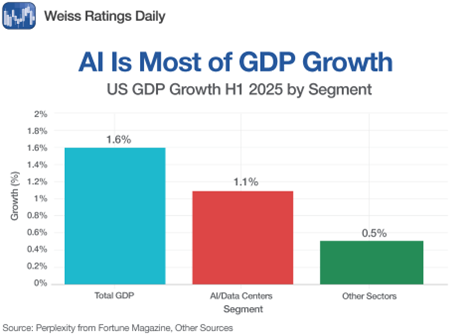Altman calls AI too important to fail, highlighting growing national dependence on AI infrastructure across healthcare, defense, and finance.
Sectors & Industries
Table of Contents
While cracks are appearing in the AI trade, Sam Altman introduced a very different kind of warning this week — one aimed not at stock prices, but at the system beneath them.
Altman said openly that the government will eventually have to act as the “insurer of last resort” for AI.
Not because companies want a bailout, but because the scale of AI has grown far beyond what private firms can guarantee on their own.
His point was simple:
AI now underpins hospitals, financial networks, military systems, grid operations, and global logistics. Any failure — a model breakdown, a major outage, or a disrupted data-center cluster — would spill into the real economy almost instantly. The risk has become too large for individual companies to absorb.
At the same time, the buildout is accelerating faster than balance sheets can handle. Companies are already borrowing heavily for power, water, and data-center capacity — and those costs are rising every quarter. As Altman put it, AI has reached the point where its continuation depends on system-level support, the same way banking and energy reliability depend on federal backstops.
This isn’t about “saving” AI companies. It’s about the government stepping in when critical infrastructure gets too big to fail — exactly the point where AI now sits.
Altman’s comment about the government eventually backstopping AI sounds dramatic, but it fits the scale of what’s happening. AI is no longer a “sector.” It’s becoming a macro driver with economy-wide impact.
AI-linked spending is already influencing GDP growth, and global data-center investment is projected to reach $3 trillion by 2028. Companies are pouring capital into power, land, cooling, and chips at a pace we haven’t seen in any modern technology cycle. The physical footprint alone — electricity, water, industrial equipment — is reshaping national infrastructure plans.
When a technology becomes this foundational to hospitals, grids, logistics, defense, and banking, governments eventually step in because the system becomes too important to leave vulnerable. That’s the context behind Altman’s “insurer of last resort” line.
In other words: AI isn’t just growing — it’s reorganizing how the economy functions.
And this is exactly why investors who rely on traditional valuation anchors — including Burry — are having a hard time right now.
Next we move to the investor reality: even transformative technologies can still disappoint the market in the short run.

Join LevelFields now to be the first to know about events that affect stock prices and uncover unique investment opportunities. Choose from events, view price reactions, and set event alerts with our AI-powered platform. Don't miss out on daily opportunities from 6,300 companies monitored 24/7. Act on facts, not opinions, and let LevelFields help you become a better trader.

AI scans for events proven to impact stock prices, so you don't have to.
LEARN MORE